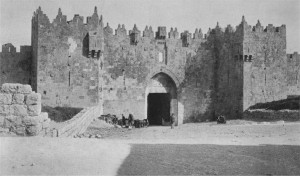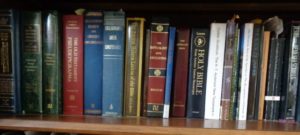- Nehemiah 13:19-21 Jerusalem gate open
19And it came to pass, that when the gates of Jerusalem began to be dark before the sabbath, I commanded that the gates should be shut, and charged that they should not be opened till after the sabbath: and some of my servants set I at the gates, that there should no burden be brought in on the sabbath day. 20So the merchants and sellers of all kind of ware lodged without Jerusalem once or twice. 21Then I testified against them, and said to them, Why lodge you about the wall? if you do so again, I will lay hands on you. From that time forth came they no more on the sabbath.
This bit of Scripture is often used to support an even to even reckoning of the day. My question is, why does it matter when they closed the gate? That is what is usually mentioned here. The thing is, the gate was shut every night. Nehemiah 7:3
1Now it came to pass, when the wall was built, and I had set up the doors, and the porters and the singers and the Levites were appointed, 2That I gave my brother Hanani, and Hananiah the ruler of the palace, charge over Jerusalem: for he was a faithful man, and feared God above many. 3And I said to them, Let not the gates of Jerusalem be opened until the sun be hot; and while they stand by, let them shut the doors, and bar them: and appoint watches of the inhabitants of Jerusalem, every one in his watch, and every one to be over against his house.
I think we should be focusing on the break in the weekly pattern. This is the fact that the gate was not opened on the 7th day daylight period to keep the merchants out. We probably can agree on this. What we may not agree with is that I maintain this bit of Scripture has nothing to do with defining an even to even reckoning of the day.



I, too have heard this passage to defend an evening to evening reckoning of a day, but then I found in Revelation 21:25 that it was typical to shut the gates at night. “On no day will its (new Jerusalem) gates ever be shut, for there will be no night there.” When I re-read Nehemiah 13:19, it seems reasonable to me to consider that the “command” for the gates be shut was not unusual or indicative of a day beginning at evening. I believe the “charge” to not have the gates opened until after the Sabbath is the focus of this verse. Given the fact that Nehemiah 7:3 states the gates are to be typically opened when the “sun was hot” — during the daylight, and what 13:21 states, it seems the problem in chapter 13 is that the merchants and sellers of all kinds of ware were standing around the wall waiting for the gates to open when the sun was hot on the Sabbath day.
This passage not only does not prove the sabbath begins in the evening, but it also does not support an evening to evening reckoning.
Thanks Isha. A second witness in Scripture! Can anyone find opposing witness that these verses do indeed support an even to even reckoning?
To reiterate a point:
If you are going to use Nehemiah 13:19-21 to help you determine how you will honor the Shabbat then let’s agree to go with that logic. The gate was indeed locked on the evening before the 7th daylight period. It seems that Nehemiah 7:3 says that the gate was also locked the other 6 evenings before the respective daylight periods. There is no pattern, it is done continually. The only break in the pattern is during the daylight times. On the 7th day, the gate was not opened but stayed closed until the following day. To follow the logic through, the break in the pattern should be determining how to keep Sabbath. The break in the pattern was for the 7th day. Why not start the clock at that point? That point would be the 7th day. Perhaps this passage is not about either an even to even or a day to day reckoning at all. Perhaps it is just about keeping outside merchants from coming into the camp to define Shabbat.
After reading through Nehemiah 7 to the end of the book just now, It seems to me when Nehemiah charged the gatekeepers not to open the gates until the heat of the day, that this was a daily thing. I believe the gates were opened every day, even the Sabbath day. After the people heard the law read (Nehemiah 8), confessed their sins (Nehemiah 9), they agreed to promise to follow the law (Nehemiah 10), they said in Nehemiah 10:31a, “When the neighboring peoples bring merchandise or grain to sell on the Sabbath, we will not buy from them on the Sabbath or on any holy day.”
This tells me the gates were also opened on Sabbath days as well as non-Sabbath days. But later while Nehemiah was away from Jerusalem for a time things went awry. (Nehemiah 13) He returned. Nehemiah 13:15-16 says, “In those days I saw men in Judah treading winepresses on the Sabbath and bringing in grain and loading it on donkeys, together with wine, grapes, figs and all other kinds of loads. And they were bringing all this into Jerusalem on the Sabbath. Therefore I warned them against selling food on that day. Men from Tyre who lived in Jerusalem were bringing in fish and all kinds of merchandise and selling them in Jerusalem on the Sabbath to the people of Judah.”
Thus when Nehemiah said in verse 19, “…I ordered the doors to be shut and not opened until the Sabbath was over”, the focus of the statement was not opened until the Sabbath was over. The city was being punished because the Israelites broke their promise made in Nehemiah 10:31.
Thank u for sharing. I have used this Scripture to ‘prove’ we are not meant to ‘trade’ on the Sabbath: whether paying for a taxi or buying bread or whatever other way we may find to ‘handle money’. Do u think my interpretation/understanding is correct? Or not?
According to Brown Driver Briggs, the word “melakah” translated as “work” in the Sabbath command means “occupation, work, business”. I think everybody ought to get a break from “work” on the Sabbath day. 😉